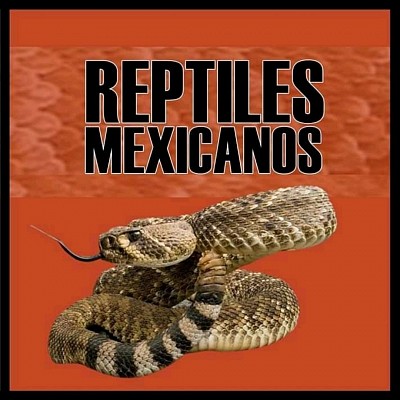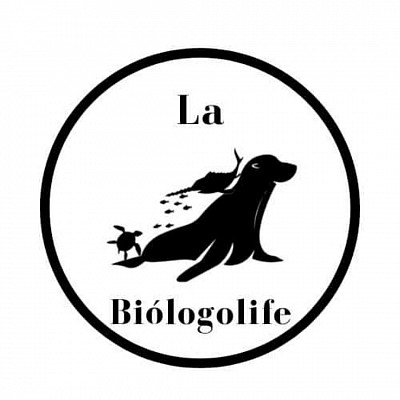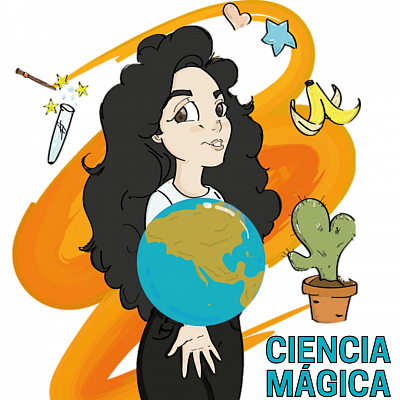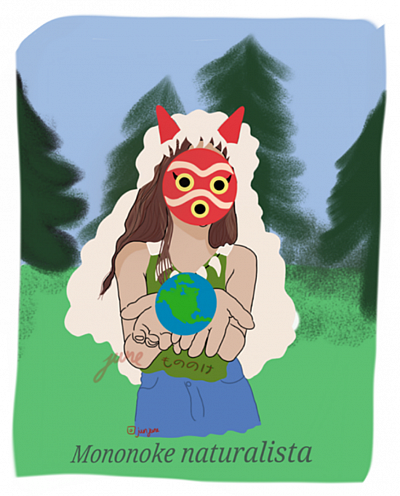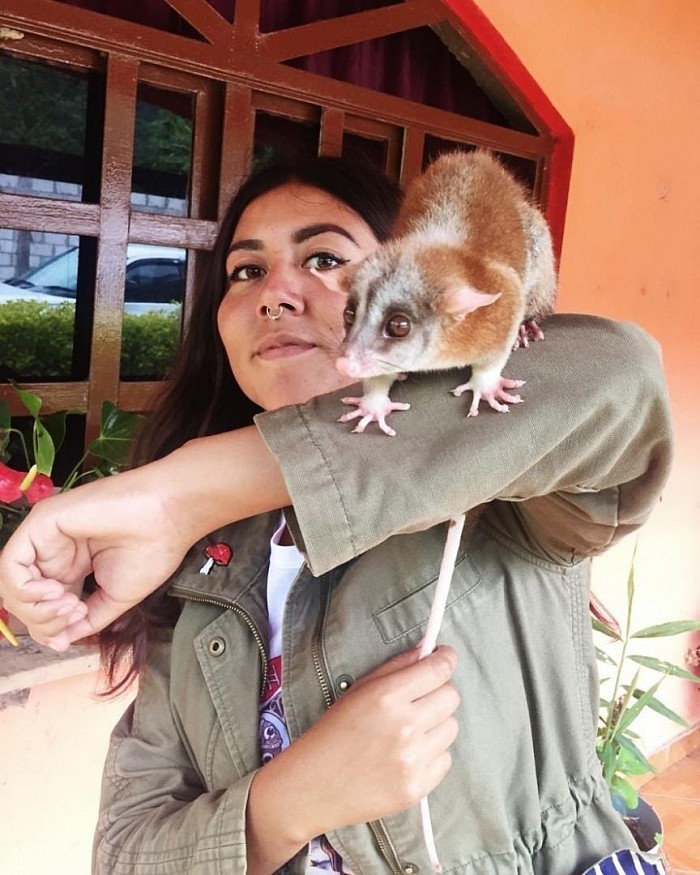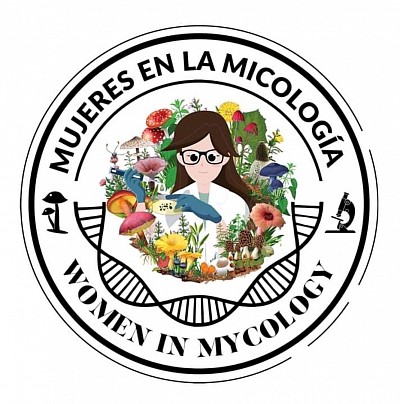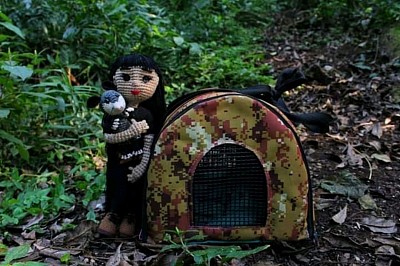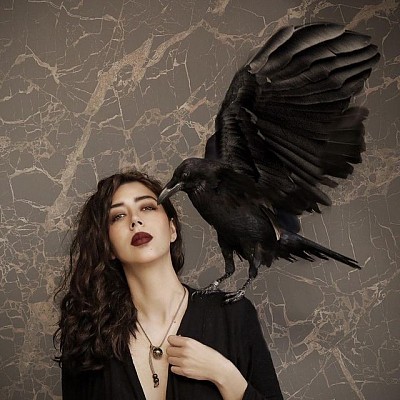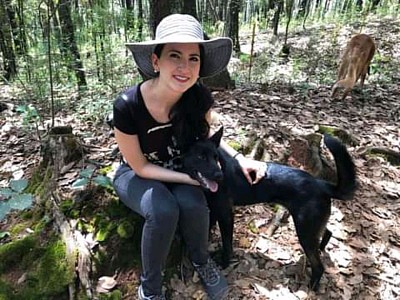ECOLOGÍA/ ECOLOGY
INTRODUCCIÓN
ENTREVISTA BRENDA E. SERRANO (EDUCACIÓN AMBIENTAL)
Para iniciar nuestro estudio del ambiente y su cuidado es necesario saber en qué consiste la formación que debemos tener para hacerlo, de lo cual nos hablará la señorita Brenda E. Serrano estudiante egresada de la Facultad de Biología de la BUAP. Espero sea de su agrado la nota.
1. Codex Natura: What is environmental education?
Brenda E. Serrano: It refers to the formation of the individual with respect to their environment, which involves not only biological issues, but coexistence, and how it is related to other species, in addition to being taken into account It also includes possible resolutions to problems related to nature.
2. Codex Natura: How does environmental education originate?
Brenda E. Serrano: The term "Environmental Education" appeared in the 70's, as an attempt to name that relationship of responsibility necessary of the human being, with nature, involving individual and sustainability issues
3. Codex Natura: What are the objectives of environmental education?
Brenda E. Serrano: 1. To achieve a less superficial awareness about the close relationship of human beings with nature, from the importance and necessity.
2. Establish guidelines that achieve an understanding about the good and responsible use of natural resources.
3. Promote good environmental practices.
4. Codex Natura: What applications does environmental education have in a daily environment within society?
Brenda E. Serrano: It has fundamental applications for the dignified and necessary maintenance of the environment. Supervising government works, teaching different educational strategies for environmental awareness, maintenance of areas and natural resources, education on the maintenance and respect of natural areas and / or species, etc.
5. Codex Natura: What is the biggest challenge facing environmental education in terms of dissemination?
Brenda E. Serrano: The paradigms that are held about the little importance about the subject, in addition to these aspects, are typical self-sacrificing government issues and budget cuts in the area of science are constant. It would be necessary to find new strategies to disseminate the information, more assertive and of quality, that manage to penetrate the consciousness of individuals from the perspective of environmental education.
Special thanks to Brenda E. Serrano for the attention given to the making of this interview. Regards.
ENTREVISTA REPTILES MEXICANOS
1. Codex Natura: How did the idea for this Facebook page come about?
Reptiles Mexicanos: It arises from wanting to take advantage of social networks, (in this case Facebook that gives us the opportunity to reach thousands of people), in order to bring information to people about the species of reptiles in Mexico.
2. Codex Natura: What are the main objectives of Reptiles Mexicanos?
Reptiles Mexicanos: At Reptiles Mexicanos we seek to disclose specific information about the reptile species in the country. Our goal is for people to have a positive view of these animals and get to know them a little more.
3. Codex Natura: Why choose reptiles as an element of study?
Reptiles Mexicanos: Reptiles are a group of which many erroneous beliefs are held due to myths that are transmitted from generation to generation. Considering that Mexico is the second country with the most diversity of reptiles in the world, conserving Mexican species is very important! And an outreach and dissemination page on Facebook can help to achieve this goal.
4. Codex Natura: How important is the species analyzed on this Facebook page for the ecosystems of Mexico?
Reptiles Mexicanos: In general, reptiles are fundamental in ecosystems, since without part of the trophic chains that maintain an ecological balance, without reptiles many animals would be left without predators or prey, so the ecosystems would collapse.
5. Codex Natura: What are the objectives of this site in the short, medium and long term?
Reptiles Mexicanos: In the short term we would like to continue uploading infographics and videos about various species, in the medium term organize virtual talks and conferences on topics of interest to reptiles and in the long term to offer courses to the general population.
Special thanks to Reptiles Mexicanos for the attention given to the making of this interview. Regards.
ENTREVISTA LA BIÓLOGOLIFE
La siguiente es una entrevista con un medio de difusión bastante interesante acerca de Biología y Ecología en redes sociales, la cual espero sea de su agrado.
1. Codex Natura: ¿Cómo surgió el concepto de la página La Biólogolife?
La Biólogolife: La biólogolife nació a principios de este año en Instagram, la finalidad principal era mostrar mi fotografía silvestre, en una salida a campo se me cayó mi cámara y se descompuso entonces dejé de subir contenido desde marzo, por cosas del destino en agosto del 2020 conocí a Lili la administradora de Biolovers y me gustó mucho su trabajo y pues de ahí pasó de subir mis fotografías a subir información científica y memes y hago la página de Facebook.
2. Codex Natura: ¿Cuál es el objetivo de esta?
La Biólogolife: La intención original es transmitir a las personas el estilo de vida de un estudiante de último año de biología marina, el COVID no me lo ha permitido como tal pero es es la idea que irá tomando la página.
3. Codex Natura: ¿Qué ha sido lo más complicado que han enfrentado a lo largo de la historia del sitio?
La Biólogolife: Que al principio no era consciente del alcance que podía tener una publicación y que no todo el mundo piensa como yo, eso me trajo algunos problemas con grupos de personas que piensan distinto y casi pierdo la página, ja ja ja.
4. Codex Natura: ¿Cuál consideran que es el papel de la biología en la sociedad actual?
La Biólogolife: El papel de la biología es muy grande, desde inculcar el amor por la naturaleza a las personas, investigar los seres vivos, también es fundamental en la medicina y en estos tiempos más que nunca debemos llevar la divulgación al público en general.
5. Codex Natura: ¿Por qué es importante la difusión de la biología dentro de la vida cotidiana de las personas?
La Biólogolife: Hay mucha desinformación en redes sociales, la ignorancia puede llegar a ser muy grande, debemos usar este medio para transmitir un mensaje de cuidado al ambiente y mostrar lo hermoso que puede llegar a ser proteger el planeta y llevar a cabo la conservación.
Un agradecimiento a La Biólogolife por la atención prestada para la realización de esta entrevista. Saludos.
English version:
The following is an interview with a very interesting media about Biology and Ecology on social networks, which I hope you like.
1. Codex Natura: How did the concept of the La Biólogolife page come about?
La Biólogolife: La biólogolife was born at the beginning of this year on Instagram, the main purpose was to show my wild photography, on a field trip I dropped my camera and broke down So I stopped uploading content since March, due to destiny in August 2020 I met Lili the Biolovers administrator and I really liked her work and because from there she went from uploading my photographs to uploading scientific information and memes and I make the Facebook page.
2. Codex Natura: What is the objective of this?
La Biólogolife: The original intention is to transmit to people the lifestyle of a final year student of marine biology, COVID has not allowed me as such but it is the idea which will take the page
3. Codex Natura: What has been the most complicated thing that you have faced throughout the history of the site?
La Biólogolife: That at first I was not aware of the scope that a publication could have and that not everyone thinks like me, that It brought some problems with groups of people who think differently and I almost lost the page, ha ha ha.
4. Codex Natura: What do you think is the role of biology in today's society?
La Biólogolife: The role of biology is very large, from instilling a love for nature in people, investigating living beings, it is also fundamental in medicine and in these times more than ever we must spread the word to the general public.
5. Codex Natura: Why is the dissemination of biology important in people's daily lives?
La Biólogolife: There is a lot of misinformation in social networks, ignorance can be very large, we must use this medium to transmit a message of take care of the environment and show how beautiful it can be to protect the planet and carry out conservation.
Special thanks to La Biólogolife for the attention given to making of this interview. Regards.
Facebook: https://www.facebook.com/1518433361525023/
Instagram: https://www.instagram.com/la_biologolife
ENTREVISTA BIOLOGANDO CON DANNI
1. Codex Natura: ¿Cómo surgió la página?
Biologando con Danni: Tenía una cuenta en Instagram donde subía los apuntes relacionados con los temas que veía en clase (todos relacionados con biología) aunque siempre tuve la inquietud de abrir mi proyecto de divulgación científica, tiempo después platicando con algunos amigos divulgadores de contenido científico, me animaron a abrir mi proyecto de divulgación científica, es ahí cuando comencé realizando infografías con temas relacionados a mi carrera, a la par creé mi página en Facebook y Tik Tok para mayor difusión del contenido.
2. Codex Natura: ¿Cuál es el objetivo de esta?
Biologando con Danni: El objetivo de este proyecto es comunicar ciencia de manera sencilla y entendible al público en general, así como impulsar a los jóvenes a interesarse en la ciencia y estar al tanto de los avances científicos y tecnológicos, otro de los objetivos de este proyecto de divulgación es resolver dudas de temas relacionados con la biología.
3. Codex Natura: ¿Qué panorama general tienes acerca de la divulgación científica en esta era de redes sociales?
Biologando con Danni: Creo que como jóvenes estamos bombardeados de redes sociales y por ende contenido absurdo y tonto, muchos jóvenes pasan horas en la pantalla del celular consumiendo contenido que no es de provecho, creo que la labor de los divulgadores es compartir el conocimiento de manera sencilla para que todos puedan comprender el mensaje que queremos dar, las redes sociales nos ayudan a que el contenido pueda llegar de manera rápida y a su vez los jóvenes se interesen por el contenido y puedan aprender algo educativo. También cabe recalcar que en las redes sociales abundan las fake news y una de las labores de los divulgadores es desmentirlas con sustento científico y fuentes verídicas.
4. Codex Natura: ¿Cuál consideras que es el mayor logro u aportación a la divulgación científica por parte de tu página?
Biologando con Danni: Últimamente he estado indagando sobre la COVID-19 y he subido información al respecto que ha ayudado a muchos a comprender temas relacionados a esta pandemia así como desmentir ciertas noticias falsas. Otro de los logros que más me han llamado la atención es recibir mensajes diciéndome que gracias a mi contenido se han dado cuenta que no todos los animales son peligrosos y lo importante que es el no matarlos cuando desconoces las especies y gracias a la información que subo han reubicado animales en vez de hacerles daño.
5. Codex Natura: ¿Cuáles son tus objetivos a corto, mediano y largo plazo?
Biologando con Danni: Un objetivo a corto plazo es seguir preparándome para subir contenido de calidad que pueda ser útil a muchas personas, a mediano plazo me gustaría darle continuidad a los talleres de educación ambiental que impartía en comunidades indígenas de Hidalgo y lamentablemente no he podido darle seguimiento debido a la pandemia, a largo plazo sería terminar mi carrera universitaria y realizar trabajos de investigación que puedan aportar a la ciencia así como consolidar talleres de ciencia para niños y jóvenes alrededor del territorio mexicano.
Un agradecimiento a Biologando con Danni por la atención prestada para la realización de esta entrevista. Saludos.
Facebook: https://www.facebook.com/pages/category/Video-Creator/Biologando-con-Danni-101621505121461/
Instagram: https://www.instagram.com/biologandocondanni/
ENTREVISTA CIENCIA MÁGICA
1. Codex Natura: ¿Cómo surge el proyecto de Ciencia Mágica?
Ciencia Mágica: En búsqueda de soluciones a problemáticas ambientales y sociales, nace Ciencia Mágica, con la finalidad de enseñar a las personas la importancia del cuidado del ambiente, así como para descubrir el mundo que nos rodea, encontrando respuestas a nuestras preguntas a través del conocimiento científico. Desde pequeña, me ha encantado la Ciencia, experimentar en el laboratorio, cuidar y conocer la naturaleza, siempre supe que quería ser Química. A mis 14 años,participe por primera vez en un concurso de Sustentabilidad, siendo campeona con mi cartel de Ecología, lo que me inspiro a seguir hablando de estos temas y actuar en pro del ambiente, colectando diversos residuos contaminantes en las calles de mi ciudad y estudiar en la Facultad de Ciencias Biológicas, UANL, para hacer realidad mi sueño de niña de ser científica, al tomar clases aquí me di cuenta de lo increíble que es la Ciencia, estaba tan asombrada de lo que veía almicroscopio, que pensé “¿Por qué no compartirla?” ¿Por qué no enseñar a las personas lo divertido que es la Ciencia?, esto fue lo queme hizo empezar a divulgar ciencia en escuelas a nivel primaria ysecundaria durante varios semestres en mi carrera, sin embargo,decidí crear mi propio proyecto “Ciencia Mágica” en el 2019 para que la Ciencia llegará alcance de todos en diferentes redes sociales.
2. Codex Natura: ¿Cuáles son los principales objetivos de este?
Ciencia Mágica: Ciencia Mágica tiene como objetivo despertar la curiosidad en las personas por explorar, investigar e innovar, aportando soluciones aproblemáticas ambientales, sociales o de salud. El objetivo principal esbrindar información útil y de calidad sobre temas de Ciencia, a travésde la Divulgación Científica y Educación Ambiental, por lo que seimparten conferencias, talleres, cursos, videos e infografías en redessociales como Facebook, Instagram, Youtube y Tiktok. Sin embargo, sabemos, que impartir charlas no es suficiente, por ellotambién generamos soluciones sostenibles e innovadoras pararesolver problemáticas globales e industriales, como la contaminaciónpor plásticos derivados del petróleo y el desperdicio de alimentos , logrando reducir la huella de carbono, a través de la creación de bioproductos innovadores que promuevan la Educación Ambiental y despierten la curiosidad por la Ciencia, así como inspirar a niños y jóvenes a estudiar carreras STEAM. Ciencia Mágica, busca que seas el científico que llevas dentro e inspirarte a cambiar el mundo, promoviendo programas de Mujeres en la Ciencia, el cumplimiento de los Objetivos del Desarrollo Sostenible de la ONU, la Educación Ambiental, entre otros.
3. Codex Natura: ¿Por qué consideras importante la incorporación de la ciencia a un estilo de vida sustentable?
Ciencia Mágica: Considero que es vital, la incorporación de Ecología y Ciencia (ECO-CIENCIA) porque a través de estas ramas podemos comprender la importancia y función de los recursos, seres vivos para lograr un ambiente sano, así como visualizar los estragos que afectan el planeta a través de nuestras acciones y poder reflexionar al respecto para cambiar ese estilo de vida basado en una economía circular, por unestilo de vida sustentable lo que sin duda, permitirá que optemos poralternativas ecológicas, logrando un futuro sustentable.
4. Codex Natura: ¿Cuál es a tu punto la repercusión de la contingencia sanitaria por el COVID 19 a los modos de vida sustentables y el ambiente mismo?
Ciencia Mágica: Durante la contingencia sanitaria por el COVID 19, me he dado cuenta que muchas personas no han reflexionado sobre la importancia decuidar el planeta, seguimos generando residuos y no nos hacemos responsables de ellos, lo que ha afectado a la fauna marina y losecosistemas, ya que se ha visto incrementada la contaminación porplásticos de un solo uso, por ejemplo muchas personas que usan mascarillas día con día no las desechan de manera adecuada, terminando tiradas en calles, ríos, alcantarillas, llegando hasta losocéanos. Lo que me hace pensar en los problemas que siguen existiendo e incrementando por la falta de conciencia ambiental y por no apostar a un modelo más sostenible. Sin embargo, no puedo negar el gran beneficio que se aportó en muchos países al principio de la pandemia, donde los niveles de gases de efecto invernadero se redujeron por el cierre de aerolíneas y otras empresas, creo que fue un instante en donde la Tierra se tomo un respiro, y siguió restaurándose, muchos árboles que talaron empezaron a desarrollar de nuevo follaje.
5. Codex Natura: ¿Cuáles son tus planes a corto, mediano y largo plazo?
Ciencia Mágica: Me veo haciendo lo que más he amado desde pequeña,experimentos e investigando, pasando horas en el laboratorio asombrándome del maravilloso mundo científico y descubriendo algo nuevo cada día, compartiendo esta pasión con los que me rodean, simplemente impactando la vida de más personas a través de la divulgación de la ciencia con Ciencia Mágica. Mi meta de todos los días es lograr un mundo mejor para todos donde exista educación de calidad y acción por el clima, llevando la Ciencia a todos los rincones del mundo y todas las mujeres puedan hacer Ciencia, rompiendo brechas de género y logrando la inclusión científica. Así como trascender a un futuro más sostenible donde cambiemos la economía lineal por una economía circular. Quiero que mi trabajo como educadora ambiental y divulgador científica sea inspiración para niños, jóvenes y adultos, mostrándoles que a través de la Ciencia podemos emprender por el ambiente y la sociedad. A largo plazo, quiero ser una científica y empresaria reconocida internacionalmente, con ECOBIORES como empresa mexicana enfocada en la producción e innovación de materiales 100% degradables y sustentables.
Un agradecimiento a Ciencia Mágica por la atención prestada para la realización de esta entrevista. Saludos.
ENTREVISTA MONONOKE NATURALISTA/ INTERVIEW WITH MONONOKE NATURALISTA
ENTREVISTA MUJERES EN LA MICOLOGÍA/ INTERVIEW WITH MUJERES EN LA MICOLOGÍA
1. Codex Natura: ¿Cómo surgió el proyecto "Mujeres en la Micología"?
Mujeres en la Micología: La idea de este equipo de divulgación científica surgió durante el congreso Latinoamericano de Micología llevado a cabo en Lima Perú en agosto de 2017, nos conocimos un grupo de mujeres en su mayoría mexicanas (Carmen Herrera de Veracruz, Xóchitl Margarito de Oaxaca, Diana Torres González, y Rut Ortega Ávila ambas de Tlaxcala) y Paola Díaz de Honduras. Durante este evento compartimos experiencias sobre nuestras investigaciones dentro de la micología, percibimos que cada una tenía un perfil especializado y de lo cual podría surgir algo interesante. Carmen es agrónoma y ha trabajado con hongos de importancia en la agricultura especialmente con el género Trichoderma y algunos fitopatógenos. Xóchitl es especialista en taxonomía y ecología de hongos micorrízicosarbusculares (Glomeromycota), Diana y Rut actualmente son profesoras y han trabajado con enzimas de hongos en el área de la biotecnología. Paola es estudiante de maestría, sin embargo, ha estado altamente involucrada con taxonomía y ecología de Myxomycetes, lo cual nos hace un equipo muy versátil e interesante dentro de la micología.
Con todo esto, coincidimos en que en nuestros países era necesario hablar más sobre estos organismos y su importancia especialmente al público que no está involucrado con el área de investigación, así como conocer quienes están investigando en esta área y qué influencia están teniendo sus investigaciones en la vida humana y del planeta. Y fue así como surgió la idea de formar este gran equipo para poder transmitir al público no sólo parte de nuestros conocimientos adquiridos durante la formación académica, sino de micólogos del mundo y ¡claro! la pasión por los hongos.
2. Codex Natura: ¿Cuáles son los principales objetivos de este?
Mujeres en la Micología:
3. Codex Natura: ¿Qué es la Micología?
Mujeres en la Micología: Es la rama de la Biología que se encarga del estudio de los hongos. Sin embargo, en nuestra página de divulgación incluimos a un grupo del reino protista, el cual comprende los myxomycetes, ya que debido a su morfología se habían tratados dentro del reino fungí en el pasado, aunque actualmente son aún estudiados por los micólogos.
4. Codex Natura: ¿Cuántas y cuáles ramas de la Micología abarcan con su proyecto?
Mujeres en la Micología: Son varias áreas que abarca la micología que van desde agricultura, medicina, industria, etc., sin embargo, en nuestra página más que ramas manejamos la información desde enfoques. Por ejemplo, hablamos sobre los hongos y myxomycetes, abordando temas relevantes dentro de ecología, taxonomía, biotecnología, etnomicología, entomología, entre otros.
5. Codex Natura: ¿Qué importancia tiene la Micología en la sociedad contemporánea?
Mujeres en la Micología: Mucha. En primera porque la Micología es un área con pocos adeptos, entonces tiene aún mucho campo por explorar, ya que al reconocer la importancia del papel que juega un grupo de organismos o taxones dentro de un ecosistema podemos crear pautas para su valorización, aplicación y su posterior conservación. La micología no sólo abarca la parte de hongos macroscópicos como la mayoría de gente cree, existen muchos hongos que no son visibles al ojo humano y que sin ellos no existirían muchos de los productos que consumimos como por ejemplo los hongos que se utilizan en el proceso de fermentación de la cerveza, los que ayudan en la maduración de quesos, los que producen substancias que son utilizadas para tratamientos de diversas enfermedades, los que atacan insectos plaga y patógenos de plantas y se utilizan para control biológico en la agricultura, y así una lista enorme de usos y aplicaciones en nuestra vida diaria. Sin embargo, es importante resaltar que a pesar de que ya existen muchos usos, aplicaciones e investigaciones micológicas, es importante divulgar su importancia e impacto de estos organismos ya que estando informados pueden surgir ideas de nuevos proyectos en el área e integrar el conocimiento con la aplicación.
6. Codex Natura: ¿Cuáles son sus objetivos a corto, mediano y largo plazo?
Mujeres en la Micología: A corto plazo: que nuestra divulgación continúe llegando a más personas en diferentes países del mundo y que el interés sobre estos organismos incremente especialmente en jóvenes y niños que son los futuros profesionistas.
Mediano: Realizar eventos de divulgación presenciales para el público en nuestro país y generar redes de conexión con investigadores y otros divulgadores científicos.
Largo: mantener la parte de divulgación y formar una ONG que tenga más impacto sobre la conservación, conocimiento y aplicaciones sobre los hongos y myxomycetes no sólo en México, sino en toda Latinoamérica o el mundo y en las diversas áreas relacionadas.
Un agradecimiento a Mujeres en la Micología por la atención prestada para la realización de esta entrevista. Saludos.
English version:
An interesting science outreach project on an important branch of the study of nature, which is not very well known. I hope you enjoy the article.
1. Codex Natura: How did the project "Mujeres en la Micología" come about?
Mujeres en la Micología: The idea of this scientific outreach team arose during the Latin American Congress of Mycology held in Lima Peru in August 2017, we met a group of mostly Mexican women (Carmen Herrera from Veracruz, Xóchitl Margarito from Oaxaca, Diana Torres González, and Rut Ortega Ávila both from Tlaxcala) and Paola Díaz from Honduras. During this event we shared experiences about our research in mycology, we perceived that each one had a specialized profile from which something interesting could emerge. Carmen is an agronomist and has worked with fungi of importance in agriculture, especially with the genus Trichoderma and some phytopathogens. Xóchitl is a specialist in taxonomy and ecology of arbuscular mycorrhizal fungi (Glomeromycota). arbuscular fungi (Glomeromycota), Diana and Rut are currently professors and have worked with fungal enzymes in the area of biotechnology. Paola is a master student, however, she has been highly involved with taxonomy and ecology of Myxomycetes, which makes us a very versatile and interesting team within mycology.
With all this, we agreed that in our countries it was necessary to talk more about these organisms and their importance, especially to the public that is not involved in the research area, as well as to know who is doing research on them. research, as well as to know who is researching in this area and what influence their research is having on human life and the planet. And that is how the idea of forming this great team idea of forming this great team to be able to transmit to the public not only part of our knowledge acquired during our academic training, but of mycologists of the world and of course! the passion for fungi.
2. Codex Natura: What are the main objectives of this one?
Mujeres en la Micología:
3. Codex Natura: What is Mycology?
Mujeres en la Micología: Mycology is the branch of biology that deals with the study of fungi. However, in our However, in our divulgation page we include a group of the protist kingdom, which includes the myxomycetes, since due to their morphology they had been treated within the fungi kingdom in the past, although they are still studied today. the past, although nowadays they are still studied by mycologists.
4. Codex Natura: How many and which branches of Mycology do you cover with your project?
Mujeres en la Micología: Mycology covers several areas ranging from agriculture, medicine, industry, etc., however, in our website we handle information from different approaches rather than branches. For example, we talk about fungi and myxomycetes, addressing relevant topics such as ecology, taxonomy, taxonomy, mycology, mycology, etc. ecology, taxonomy, biotechnology, ethnomycology, entomology, among others.
5. Codex Natura: How important is mycology in contemporary society? society?
Mujeres en la Micología: A lot. First of all because mycology is an area with few followers, so there is still a lot of room to explore. It is important to recognize the importance of the role played by a group of organisms or taxa within an ecosystem, so that we can create guidelines for their valuation, application and subsequent conservation. Mycology does not only cover macroscopic fungi as most people believe, there are many fungi that are not visible to the human eye and without them many of the products we consume would not exist, such as the fungi used in the fermentation process of beer, those that help in the maturation of cheeses, those that produce substances that are used for the treatment of various diseases, those that attack insect pests and plant pathogens and are used for biological control in agriculture, and so on, a huge list of fungi. agriculture, and a huge list of uses and applications in our daily lives. However, it is important to emphasize that although there are already many mycological uses, applications and researches, it is important to disseminate the importance and impact of these organisms, since being informed It is also important to emphasize that although there are already many mycological uses, applications and research, it is important to disseminate the importance and impact of these organisms, since being informed can lead to ideas for new projects in the area and integrate knowledge with application.
6. Codex Natura: What are your short-, medium- and long-term objectives? term objectives?
Mujeres en la Micología: In the short term: That our outreach continues to reach more people in different countries around the world and that interest in these organisms increases, especially among young people and children, who are the future professionals.
Medium: To carry out outreach events for the public in our country and to generate networks of connection with researchers and other scientific disseminators.
Long: Maintain the outreach part and form an NGO that has more impact on the conservation, knowledge and applications of fungi and myxomycetes not only in Mexico, but also in all of Latin America or in the rest of the world. Mexico, but in all Latin America or the world and in the different related areas.
Special thanks to Mujeres en la Micología for the attention given for the realization of this interview. Regards.
Contacto: [email protected]
ENTREVISTA GABRIELA SILVESTRE (TLACUY)/ INTERVIEW WITH GABRIELA SILVESTRE (TLACUY)
1. Codex Natura: ¿Cómo surgió el proyecto?
Gabriela Silvestre (Tlacuy): He tenido la oportunidad de crecer en un Valle que alberga gran diversidad de especies de flora y fauna, por lo cual, desde muy pequeña, fuí generando esa conciencia por la vida y cuestionandome el porqué a esa vida se le desvaloriza y afecta de tan diversas maneras. Esto también género que cuando veía a un animal no humano vulnerable, buscara la manera de apoyarle, ya fuera alguna lechuza, pichón, salamandra, tlacuache o algún otro animal que llegara a encontrarse en peligro.
Pero a todo esto, hay un detonante que marcó un antes y un después en mi andar que fué el que llegaran a mí en un mismo momento dos de los animales por los que siempre había estado luchando para erradicar creencias sobre ellos, estos animales fueron un tlacuache (Tlacuy) y un tlaconete (salamandra). Con anterioridad había rescatado a varios de estas especies pero el que llegaran a la par lo quise interpretar como una señal.
Gracias a Tlacuy me percaté más de la falta de información y empatía que existe hacía ciertas especies, que no había alguien en mi región que se dedicara a su rescate, rehabilitación y reintegración a la vida Silvestre y que en todo el país y de manera más generalizada en Latinoamérica, muy pocas personas lo hacen. Aparte, con el tiempo fuí percatándome que gran parte de la información proporcionada para su rescate era incorrecta, estos y demás factores, me hicieron comenzar con esta lucha que hoy día representa una causa.
Con el paso del tiempo, ante varios debates conmigo misma entre si dar o no a conocer el trabajo que venía realizando, es que abrí la página de Tlacuy y la de Gabriela Silvestre, con la finalidad de promover el respeto por la vida silvestre, la Educación Ambiental y más.
2. Codex Natura: ¿Cuáles son los principales objetivos de estos proyectos?
Gabriela Silvestre (Tlacuy): Con el proyecto de Tlacuy, promover el respeto por la vida Silvestre, principalmente los Marsupiales mexicanos, hacer red y compartir los rescates que realizamos haciendo incapié en la importancia de su reintegración a la vida Silvestre, etc.
Gabriela Silvestre es un proyecto más general donde compartimos información de nuestras posturas ante diversos temas, educación ambiental, datos que consideramos interesantes e importantes, consume local o cosas que simplemente nos gustan.
También algo que considero de vital importancia y realizamos en ambos proyectos, es la bioculturalidad, por lo que comparto arte de otras personas generando un mensaje con lo que realizan, fotografía, cine, documentales, etc. por lo que año tras año surge también la Tlacuachada que es un evento donde se concentra todo, absolutamente todo.
3. Codex Natura: ¿Cómo consideras que es la postura actual de los jóvenes en el cuidado del ambiente?
Gabriela Silvestre (Tlacuy): Es complejo, ya que si bien, hay varias personalidades que representan una lucha ambiental-social que han podido generar un gran impacto en las generaciones jóvenes, también hay muchas personas sin esa conciencia pero con distintos privilegios, por lo que es importante de manera empática y solidaria informar y accionar de otras maneras ante los impactos que están sucediendo en la Tierra donde los más afectados por quienes verdaderamente están siendo los causantes de esta devastación, son quienes menos llegan a tener acceso a esta información.
Por ello, es necesario ampliar más ese conocimiento y promoverlo desde las infancias.
4. Codex Natura: ¿Cuál es a tu punto de vista sobre la importancia del uso de redes sociales en la difusión de proyectos del cuidado ambiental?
Gabriela Silvestre (Tlacuy): Las redes sociales si que son importantes, efectivas y de gran utilidad cuando son bien aprovechadas y se puede informar e impactar de una manera positiva a la población, pero en ocasiones, también generan odio, falsedad y desinformación.
Últimamente vemos gran cantidad de publicaciones donde se pretende "informar" ante ciertos temas, pero desgraciadamente en lugar de lograr algo positivo resulta que lo que se llega a compartir está mal, provocando que las personas se queden con una idea errónea y desgraciadamente en muchas ocasiones son los mismos que generan círculos de odio ante otras causas o proyectos y que sólo se dejan llevar por esas corrientes sin informarse realmente o que sólo pretenden obtener un beneficio personal aprovechándose de esto, entre otras cosas.
Pienso que es triste, sin embargo igual da convicción para seguir luchando y compartiendo lo que se hace para fijar pautas donde más personas con afinidad se involucren.
Ante está desinformación que se genera, es importante hacer hincapié en investigar más allá de lo que vemos en redes sociales, buscar artículos, fanzines, documentales, libros, videos y demás cosas que nos permitan forjar nuestro propio criterio y no solo compartir por compartir.
Por ello, igual es importante hablar de nuestro accionar real, ser ejemplo, motivar para que de esa manera día tras día seamos más, compartir lo bueno y lo malo, ser humildes, empáticos, honestos y accionar desde la horizontalidad y junto con personas con las que hay afinidad.
En este aspecto, sin duda hay mucho que se puede mejorar y reinventar.
5. Codex Natura: ¿Cuáles son tus planes a corto, mediano y largo plazo?
Gabriela Silvestre (Tlacuy): Por ahora que ya se acerca la temporada de reproducción, donde más animales llegan a verse en situaciones de vulnerabilidad, en el caso de los tlacuaches, es cuando más se encuentran madres que fueron muertas por atropellamientos, ataques de personas, perros, gatos, etc; y llevan crías en el marsupio. Espero que aquellos animales que lleguen a nuestro resguardo puedan ser reintegrados a la vida Silvestre, pero sobre todo deseo que las cosas cambien y que se genere más empatía para que los rescates dejen de ser necesarios. Gracias.
Un agradecimiento a Gabriela Silvestre (Tlacuy) por la atención prestada para la realización de esta entrevista. Saludos.
English version:
An article focused on one person's projects that are quite interesting in the field of nature care. I hope you like the article.
1. Codex Natura: How did the project come about?
Gabriela Silvestre (Tlacuy): I have had the opportunity to grow up in a valley that is home to a great diversity of species of flora and fauna, which is why, from a very young age, I was generating this awareness for life and questioning why this life is devalued and affected in so many different ways. This also meant that when I saw a vulnerable non-human animal, I looked for a way to support it, whether it was an owl, a pigeon, a salamander, an opossum or any other animal that was in danger.
But to all this, there is a trigger that marked a before and after in my walk that was that two of the animals that I had always been fighting to eradicate beliefs about them came to me at the same time, these animals were a tlacuache (Tlacuy) and a tlaconete (salamander). I had previously rescued several of these species but I wanted to interpret the fact that they arrived together as a sign.
Thanks to Tlacuy I became more aware of the lack of information and empathy that exists for certain species, that there was no one in my region dedicated to their rescue, rehabilitation and reintegration into the wild and that in the whole country and more generally in Latin America, very few people do it. Besides, as time went by I realized that most of the information provided for their rescue was incorrect, these and other factors made me start with this fight that today represents a cause.
With the passage of time, after several debates with myself about whether or not to publicize the work I had been doing, I opened Tlacuy's and Gabriela Silvestre's websites, with the aim of promoting respect for wildlife, environmental education and more.
2. Codex Natura: What are the main objectives of these projects?
Gabriela Silvestre (Tlacuy): With Tlacuy's project, to promote respect for wildlife, mainly Mexican Marsupials, to network and share the rescues we do, emphasizing the importance of reintegrating them into the wild, etc.
Gabriela Silvestre is a more general project where we share information about our positions on various issues, environmental education, data that we consider interesting and important, local consumption or things that we simply like.
Also something that I consider of vital importance and we do in both projects, is bioculturality, so I share art of other people generating a message with what they do, photography, film, documentaries, etc. so year after year also arises the Tlacuachada which is an event where everything is concentrated, absolutely everything.
3. Codex Natura: What do you think is the current attitude of young people towards environmental protection?
Gabriela Silvestre (Tlacuy): It is complex, because although there are several personalities who represent an environmental-social struggle that have been able to generate a great impact on the younger generations, there are also many people without that awareness but with different privileges, so it is important in an empathetic and supportive way to inform and act in other ways to address the impacts that are happening on Earth where the most affected by those who are really causing this devastation, are those who have less access to this information.
Therefore, it is necessary to expand this knowledge and promote it from childhood.
4. Codex Natura: What is your point of view on the importance of the use of social networks in the dissemination of environmental care projects?
Gabriela Silvestre (Tlacuy): Social networks are important, effective and very useful when they are well used and can inform and impact the population in a positive way, but sometimes they also generate hatred, falsehood and misinformation.
Lately we see a lot of publications where they try to "inform" about certain issues, but unfortunately instead of achieving something positive, it turns out that what is shared is wrong, causing people to get the wrong idea and unfortunately in many occasions they are the same people who generate circles of hate against other causes or projects and who only get carried away by these currents without really informing themselves or who only try to obtain a personal benefit by taking advantage of this, among other things.
I think it is sad, but it still gives conviction to continue fighting and sharing what is being done to set guidelines where more people with affinity get involved.
Faced with this misinformation that is generated, it is important to emphasize research beyond what we see in social networks, look for articles, fanzines, documentaries, books, videos and other things that allow us to forge our own criteria and not just share for the sake of sharing.
In this aspect, there is undoubtedly much room for improvement and reinvention.
5. Codex Natura: What are your short-, medium- and long-term plans?
Gabriela Silvestre (Tlacuy): For now that the breeding season is approaching, when more animals are in vulnerable situations. In the case of the tlacuaches, it is when we find more mothers that were killed by being run over, attacked by people, dogs, cats, etc. and are carrying offspring in the marsupium. I hope that those animals that reach our shelter can be reintegrated into the wild, but above all I hope that things change and that more empathy is generated so that rescues are no longer necessary. Thank you.
Special thanks to Gabriela Silvestre (Tlacuy) for the attention she gave us for this interview. Regards.
Youtube:
Instagram:
Tlacuy:
Gabriela Silvestre:
Gabriela Silvestre:
Twitter:
ENTREVISTA MADRE CUERVO/ INTERVIEW WITH MADRE CUERVO
Un artículo con una persona la cual es muy talentosa y multifacética, y que por ello decidí entrevistar, así que sin más les dejo el siguiente artículo, esperando sea de su agrado.
1. Codex Natura: ¿Cómo inicia tu historia con Egaeus y cuál es tu mejor experiencia con él?
Madre Cuervo: Fue un caso de adopción, y la mejor experiencia que he tenido con él, yo creo que fue la primera vez que lo escuché hablar, pues su primera palabra fue "mamá" y me conmovió mucho.
2. Codex Natura: ¿Cuál ha sido la situación más complicada que has atravesado con Egaeus?
Madre Cuervo: Yo creo que sería pues todo el asunto que pasó con mis vecinos, en resumen, me acusaron de ser bruja por tener un cuervo y nos terminaron desalojando del edificio donde yo vivía.
3. Codex Natura: Tomando en cuenta que el Naturismo es una filosofía que abarca también la naturalidad del cuerpo humano sobre todo en la desnudez y el hecho de que tu faceta como modelo ha tocado este tema también, ¿cuál es tu opinión o como forma parte de tu vida el tema del desnudo?
Madre Cuervo: El desnudo para mí es importante, pues me parece es la única forma real de mostrarte y es igual de importante aprenderte a ver a través de los ojos de los demás, en el caso de modelaje de desnudos ya sea para dibujo, puntura, escultura o fotografía, considero que uno pasa a ser masa para la creación de alguien más musa y masa para alguien más).
4. Codex Natura: ¿Cómo surge la idea de unirte a la Asociación Astronómica del Valle de Toluca y porque decides hacerlo?
Madre Cuervo: Surgió por una ex pareja que yo tuve que me acercó a este grupo y pues me dí cuenta que tenía muchos intereses en común con las personas que formas que formaban parte de la asociación. Me fuí educando y encariñando con ellos y ahora soy vocal de la Asociación.
5. Codex Natura: ¿Cuál consideras que es la importancia de la divulgación de temas científicos, ambientales y artísticos en redes sociales?
Madre Cuervo: Es muy complejo, y es que, si bien hay muchos divulgadores hoy en día, hay que cuidar las fuentes, la veracidad de la información que se transmite, porque el trabajo de un divulgador es complicado y de gran importancia, el como tú comunicas y los datos que tu comunicas muchas veces definen cosas importantes del aprendizaje de alguien más, entonces es responsabilidad del divulgador comprobar la información que esta dando y también encontrar la forma de comunicarla, pues la educación es una cosa muy compleja y el divulgador tiene la obligación de que le aprendiz entienda y no al revés.
6. Codex Natura: ¿Cómo logras hacer una coordinación entre los diversos temas que manejas en tus redes sociales, tomando en cuenta lo diversos que son entre sí?
Madre Cuervo: Todos en cierta medida forman parte de mi personalidad, entonces en redes sociales trato de ser muy transparente y al formar todas estas cosas parte de mi vida es muy natural que confluyan entre ellas, porque realmente en mi vida están presentes todas al mismo tiempo, entonces funciona así.
Un agradecimiento a Madre Cuervo por la atención prestada para la realización de esta entrevista. Saludos.
English versión:
An article with a person who is very talented and multifaceted, and that's why I decided to interview him, so without further ado I leave you the following article, hoping it will be to your liking.
1. Codex Natura: How did your story with Egaeus begin and what is your best experience with it?
Madre Cuervo: It was a case of adoption, and the best experience I've had with him, I think it was the first time I heard him speak, because his first word was "mom" and I was very moved.
2. Codex Natura: What has been the most complicated situation you have gone through with Egaeus?
Madre Cuervo: I think it would be the whole thing that happened with my neighbors, in short, they accused me of being a witch for having a crow and ended up evicting us from the building where I lived.
3. Codex Natura: Taking into account that Naturism is a philosophy that also embraces the naturalness of the human body, especially in nudity and the fact that your facet as a model has also touched on this issue, what is your opinion or how is the theme of nudity part of your life?
Madre Cuervo: The nude is important to me, because I think it is the only real way to show yourself and it is equally important to learn to see yourself through the eyes of others, in the case of nude modeling whether for drawing, stitching, sculpture or photography, I believe that one becomes mass for the creation of someone else 8musa and mass for someone else).
4. Codex Natura: How did the idea of joining the Astronomical Association of the Toluca Valley come up and why did you decide to do it?
Madre Cuervo: It came about because of an ex-partner I had who brought me closer to this group and I realized that I had many interests in common with the people who were part of the association. I became educated and became attached to them and now I am a member of the Association.
5. Codex Natura: What do you think is the importance of disseminating scientific, environmental and artistic topics on social networks?
Madre Cuervo: It is very complex, and although there are many disseminators today, you have to take care of the sources, the veracity of the information that is transmitted, because the work of a disseminator is complicated and of great importance, the way you communicate and the data that you communicate often define important things for someone else's learning, so it is the responsibility of the disseminator to check the information that is being given and also to find the way to communicate it, because education is a very complex thing and the disseminator has the obligation to make the learner understand and not the other way around.
6. Codex Natura: How do you manage to coordinate the different topics you handle in your social networks, taking into account how different they are from each other?
Madre Cuervo: To a certain extent they are all part of my personality, so in social networks I try to be very transparent and since all these things are part of my life it is very natural that they come together, because in my life they are all present at the same time, so it works like that.
Special thanks to Mon Valenzuela for the attention given to the realization of this interview. Regards.
Facebook: https://www.facebook.com/mon.egaeus
Instagram: https://www.instagram.com/madrecuervoo
Onlyfans: https://onlyfans.com/mon_valenzuela
Tiktok: https://www.tiktok.com/@la.m0n?source=h5_m&_r=1
Twitter: https://twitter.com/mon_valenzuela
ENTREVISTA MARIANA CASSAIGNE/ INTERVIEW WITH MARIANA CASSAIGNE
1. Codex Natura: ¿Cómo surge la apreciación que tienes acerca de la naturaleza?
2. Codex Natura: ¿Por qué consideras que es parte fundamental el cuidado del ambiente para el ser humano?
Mariana Cassaigne: Porque coexistimos en este mismo planeta. El ser humano no puede vivir sin ella y muchas veces damos por sentado que estos paisajes que vemos a diario van a seguir ahí, cuando no es así y puede no serlo siempre. Estamos atravesando la sexta extinción masiva, la única que ha sido a causa de los humanos y que se ha llevado ya a muchísimas especies y pocas personas saben de esto, debería ser el titular de las noticias cada día, sin embargo, pocos medios lo han mencionado. Es fundamental que el cuidado al medio ambiente se convierta en una prioridad para los gobiernos y que sea una obligación para todos
3. Codex Natura: ¿Formas parte de algún grupo o has apoyado de forma individual alguna causa relacionada con el cuidado de la naturaleza?
Mariana Cassaigne: Sí, he trabajado con Zamá México y Naturalia haciendo proyectos para mis alumnos. Con Naturalia se crearon proyectos de conservación de especies, como lo son el perrito de la pradera y el jaguar mexicano. Con Zamá se logró crear consciencia en los alumnos y sus familias para desechar de manera adecuada los plásticos de un solo uso creando ecoladrillos. Con esos mismos ecoladrillos construímos una casita ecológica de perro misma que donamos al albergue San Cristóbal. Con este mismo proyecto nos fuimos al ISTE Philadelphia 2019 a presentarlo en una exposición internacional.
4. Codex Natura: Parte general de la apreciación y cuidado del entorno también incluye percepciones de la aceptación del cuerpo humano de filosofías como el nudismo naturismo, ¿qué opinas de esta forma de pensar, además de si has llegado a practicar de alguna actividad relacionada con esta forma de pensar?
Mariana Cassaigne: Me parece una expresión muy bella de conexión con la naturaleza. Yo nunca la he llevado a cabo
5. Codex Natura: Por último, ¿cómo se engloban los conceptos antes mencionados en tu vida cotidiana?
Mariana Cassaigne: En mi vida cotidiana procuro siempre ser muy responsable con los recursos que tomo del planeta, por esa y otras razones yo llevo una dieta vegana y también cuido mucho el cómo me deshago de los desperdicios. En casa hacemos composta junto con la organización Hagamos Composta, separamos nuestra basura y reciclamos, utilizamos detergente biodegradable de la marca Eco Breeze que además por cada paquete comprado hace una donación a alguna organización, seguimos haciendo ecoladrillos y donándolos a Zamá para que con ellos se construyan casas a personas de escasos recursos, entre otras cosas.
Un agradecimiento a Mariana Cassaigne por la atención prestada para la realización de esta entrevista. Saludos.
English version:
The following interview is with a person I appreciate very much and whom I met in the field of music. I hope you enjoy the article.
1. Codex Natura: How did your appreciation of nature come about?
Mariana Cassaigne: I don't really know where it came from. I guess I've always felt admiration for it, I've always been surprised to see what nature gives us every day: sunrises, sunsets, birds singing, the sea, the forests, the mountains. Since I was a child I have been attracted to it and I feel connected to nature.
2. Codex Natura: Why do you think it is essential for human beings to take care of the environment?
Mariana Cassaigne: Because we coexist on the same planet. Human beings cannot live without it and we often take for granted that the landscapes we see every day will continue to be there, when this is not the case and may not always be the case. We are going through the sixth mass extinction, the only one that has been caused by humans and that has already taken many species and few people know about it, it should be the headline of the news every day, however, few media have mentioned it. It is essential that care for the environment becomes a priority for governments and an obligation for everyone.
3. Codex Natura: Are you part of any group or have you individually supported any cause related to the care of nature?
Mariana Cassaigne: Yes, I have worked with Zamá México and Naturalia doing projects for my students. With Naturalia we created species conservation projects, such as the prairie dog and the Mexican jaguar. With Zamá we were able to create awareness in the students and their families to properly dispose of single-use plastics by creating eco-bricks. With those same eco-bricks we built an ecological dog house which we donated to the San Cristobal shelter. With this same project we went to ISTE Philadelphia 2019 to present it in an international exhibition.
4. Codex Natura: General part of the appreciation and care of the environment also includes perceptions of the acceptance of the human body of philosophies such as naturism nudism, what do you think of this way of thinking, and if you have come to practice any activity related to this way of thinking?
Mariana Cassaigne: I think it is a very beautiful expression of connection with nature. I have never done it.
5. Codex Natura: Finally, how do the concepts mentioned above fit into your daily life?
Mariana Cassaigne: In my daily life I always try to be very responsible with the resources I take from the planet, for that and other reasons I follow a vegan diet and I am also very careful about how I dispose of my waste. At home we make compost together with the organization Hagamos Composta, we separate our garbage and recycle, we use Eco Breeze biodegradable detergent and for every package purchased we make a donation to an organization, we continue making eco-bricks and donating them to Zamá to build houses for low-income people, among other things.
Special thanks Mariana Cassaigne for the attention she gave us for this interview. Regards.
Facebook: https://www.facebook.com/192207147474800/
Instagram: https://instagram.com/mariancassaigne
ENTREVISTA MARIFER CASTILLO/ INTERVIEW WITH MARIFER CASTILLO
1. Codex Natura: ¿Cómo surge la apreciación que tienes acerca de la naturaleza?
Marifer Castillo: Creo que la naturaleza es parte fundamental de nuestra existencia, y tiene tanta magia; que es imposible no apreciarla.
2. Codex Natura: ¿Por qué consideras que es parte fundamental el cuidado del ambiente para el ser humano?
Marifer Castillo: Nosotros cómo especie, somos invitados a este inmenso e increíble paraíso por lo cual: nuestra responsabilidad es respetar y cuidar nuestros hogar.
3. Codex Natura: ¿Formas parte de algún grupo o has apoyado de forma individual alguna causa relacionada con el cuidado de la naturaleza?
Marifer Castillo: Si, me gusta mucho participar en campañas de reforestación, tener muchas plantas en casa y agradecerles todas las propiedades que nos dan para comer y curarnos.
4. Codex Natura: Parte general de la apreciación y cuidado del entorno también incluye percepciones de la aceptación del cuerpo humano de filosofías como el nudismo naturismo, ¿qué opinas de esta forma de pensar, además de si has llegado a practicar de alguna actividad relacionada con esta forma de pensar?
Marifer Castillo: Creo que todos los seres humanos tenemos el derecho de ser nosotros mismos y si nuestras creencias no le hacen daño a nadie, podemos llevarlas a cabo.
No he practicado el nudismo como tal, pero si la auto apreciación, el aceptarse como uno es y así mismo a los demás. Siempre buscando mejorar y ser una mejor versión mía.
5. Codex Natura: Por último, ¿cómo se engloban los conceptos antes mencionados en tu vida cotidiana?
Marifer Castillo: Considero que debe ser algo que hagamos de forma consciente todos los días y no por moda, el respetar la naturaleza, pedirle permiso para cultivar los alimentos que nos dan, darle un abrazo a la Pachamama que nos permite ser parte de su hogar y convivir con todos los animales y seres vivos.
Es importante empezar a crear una conciencia en las futuras generaciones para que esa conexión y respeto perdure.
Un agradecimiento a Marifer Castillo por la atención prestada para la realización de esta entrevista. Saludos.
English version:
The following interview is with a person that I appreciate very much and that I met in the music field and that I have already had collaborations in other projects before with her. I hope you like the article.
1. Codex Natura: How does your appreciation of nature come about?
Marifer Castillo: I believe that nature is a fundamental part of our existence, and it has so much magic; it is impossible not to appreciate it.
2. Codex Natura: Why do you think it is essential for human beings to take care of the environment?
Marifer Castillo: We, as a species, are invited to this immense and incredible paradise; therefore, our responsibility is to respect and take care of our home.
3. Codex Natura: Are you part of any group or have you individually supported any cause related to the care of nature?
Marifer Castillo: Yes, I like to participate in reforestation campaigns, have many plants at home and thank them for all the properties they give us to eat and heal us.
4. Codex Natura: General part of the appreciation and care of the environment also includes perceptions of the acceptance of the human body from philosophies such as naturism nudism, what do you think of this way of thinking, and if you have come to practice any activity related to this way of thinking?
Marifer Castillo: I believe that all human beings have the right to be ourselves and if our beliefs do not harm anyone, we can carry them out.
I have not practiced nudism as such, but I have practiced self-appreciation, accepting oneself as one is and accepting others as well. Always looking to improve and be a better version of myself.
5. Codex Natura: Finally, how do the concepts mentioned above fit into your daily life?
Marifer Castillo: I think it should be something that we do consciously every day and not by fashion, to respect nature, ask permission to grow the food they give us, give a hug to the Pachamama that allows us to be part of her home and live with all animals and living beings.
It is important to start creating awareness in future generations so that this connection and respect will last.
Special thanks to Marifer Castillo for the attention given to the realization of this interview. Regards.
ENTREVISTA SHARON PORTILLA/ INTERVIEW WITH SHARON PORTILLA
El siguiente artículo es con una gran artista y persona con la que ya había colaborado anteriormente en otros proyectos, sin embargo esta vez acorde al tema ambiental y humanista de este proyecto. Espero sea de su agrado la nota.
1. Codex Natura: ¿Cómo surge la apreciación que tienes acerca de la naturaleza?
Sharon Portilla: Siempre he sido ferviente amante del respeto y cuidado de la naturaleza, la madre tierra; flor y fauna en general.
2. Codex Natura: ¿Por qué consideras que es parte fundamental el cuidado del ambiente para el ser humano?
Sharon Portilla: Debería ser, en efecto, un acto fundamental que, considero, debería ser inculcado en la educación y cultura del mundo. El ser humano es el único ser sobre la tierra que desarrolla plena conciencia en su actuar, que tiene memoria y capacidad retentiva que le permite hablar, razonar, relacionar, etc y actúa con una consciente consecuencia. A diferencia de los animales y plantas cuyos reinos son instintivos.
Por eso la responsabilidad recae en el ser humano enormemente.
3. Codex Natura: ¿Formas parte de algún grupo o has apoyado de forma individual alguna causa relacionada con el cuidado de la naturaleza?
Sharon Portilla: Afortunadamente en el área donde resido actualmente, en CDMX, se realiza limpieza constante de las áreas naturales de nuestra zona. Recolección de basura, reciclaje y más. Nosotros como vecinos apoyamos y procuramos que nuestros espacios sean habitables sin invadir las áreas verdes.
De manera personal evito el consumismo y procuro adquirir productos naturales y que emanen residuos asimilables y amables con el medio ambiente.
4. Codex Natura: Parte general de la apreciación y cuidado del entorno también incluye percepciones de la aceptación del cuerpo humano de filosofías como el nudismo naturismo, ¿qué opinas de esta forma de pensar, además de si has llegado a practicar alguna actividad relacionada con esta forma de pensar?
Sharon Portilla: No estaba familiarizada con el nudismo como parte de una filosofía que soporte el cuidado del medio ambiente, sino que me parecía más una práctica moral que fomenta la liberación humana y la búsqueda de la aceptación de cualquier fisionomía. Sin embargo, también entiendo que el nudismo, a su vez, fomenta el no consumismo así como el naturismo apoya el empleo de medios naturales.
Desde mi punto de vista considero que, si bien el nudismo presiento que apela más a un sustento ideológico que expone la desnudez entera como una búsqueda de equilibrio físico con respecto a reglas morales impuestas, reglas culturales y más; como tal, el nudismo ciertamente evitaría el desmesurado consumo textil actual, ya que actualmente la industria textil es la segunda industria más contaminante del mundo.
Aún así, considero que el nudismo sería una exposición drástica y extremista; pues también es real que para lograr cambios en el mundo, particularmente en los países con culturas e ideologías inamovibles, es indispensable tomar acciones de pasos en pasos. El primero sería fomentar conciencia. Hoy día existen muchas propuestas de Moda sostenible que precisamente promueve maneras de consumir ropa de maneras más conscientes en todo el mundo.
Incluso en México existen marcas de moda sustentable como Cöko, Bamboo Life, Carla Fernández y varias más.
5. Codex Natura: ¿Cómo aplicamos estos conceptos antes mencionados en otros ámbitos, en especial, la composición de los proyectos musicales dónde colaboras?
Sharon Portilla: La música es una de las artes más maravillosas que existe. Justamente a través de ella se puede acariciar el alma, el espíritu e incluso el subconsciente de cualquiera. Es una manera noble y sutil de expresar cualquier mensaje. Literalmente cualquier mensaje. La música es un lenguaje universal, por eso es fácil que un mensaje sea comprendido en cualquier parte del mundo.
6. Codex Natura: Por último, ¿que tipo de filosofía consideras que aplicas en tu vida en general o practicas en base a tu forma de pensar?
Codex Natura: Pues más que una filosofía considero que es importante vivir y actuar con coherencia. Es decir, si pienso que hacer tal o cual cosa está en contra de mi sentir, entonces no lo hago. Es simplemente actuar con conciencia, amor y respeto hacia el entorno, hacia el otro y siempre hacia uno mismo. Siempre.
Un agradecimiento a Sharon Portilla por la atención prestada para la realización de esta entrevista. Saludos.
English version:
The following article is with a great artist and person with whom I had previously collaborated in other projects, however this time according to the environmental and humanistic theme of this project. I hope you enjoy the article.
1. Codex Natura: How did your appreciation of nature come about?
Sharon Portilla: I have always been a fervent lover of respect and care for nature, mother earth, flowers and fauna in general.
2. Codex Natura: Why do you consider that caring for the environment is fundamental for human beings?
Sharon Portilla: It should be, in fact, a fundamental act that, I believe, should be instilled in the education and culture of the world. The human being is the only being on earth that develops full consciousness in his actions, that has memory and retentive capacity that allows him to speak, reason, relate, etc. and act with a conscious consequence. Unlike animals and plants whose kingdoms are instinctive.
That is why the responsibility falls on the human being enormously.
3. Codex Natura: Are you part of any group or have you individually supported any cause related to the care of nature?
Sharon Portilla: Fortunately in the area where I currently live, in CDMX, there is constant cleaning of the natural areas of our area. Garbage collection, recycling and more. We as neighbors support and try to make our spaces habitable without invading the green areas.
Personally, I avoid consumerism and try to buy natural products that emanate assimilable and environmentally friendly waste.
4. Codex Natura: General part of the appreciation and care of the environment also includes perceptions of the acceptance of the human body from philosophies such as naturism nudism, what do you think of this way of thinking, and if you have come to practice any activity related to this way of thinking?
Sharon Portilla: I was not familiar with nudism as part of a philosophy that supports environmental care, but rather it seemed to me more of a moral practice that encourages human liberation and the pursuit of acceptance of any physiognomy. However, I also understand that nudism, in turn, encourages non-consumerism just as naturism supports the use of natural means.
From my point of view I consider that, although nudism I feel that it appeals more to an ideological sustenance that exposes the whole nudity as a search for physical balance with respect to imposed moral rules, cultural rules and more; as such, nudism would certainly avoid the current disproportionate textile consumption, since currently the textile industry is the second most polluting industry in the world.
Even so, I consider that nudism would be a drastic and extremist exposure; for it is also true that in order to achieve changes in the world, particularly in countries with immovable cultures and ideologies, it is indispensable to take actions one step at a time. The first would be to promote awareness. Today there are many proposals of sustainable fashion that precisely promotes ways to consume clothes in more conscious ways around the world.
Even in Mexico there are sustainable fashion brands such as Cöko, Bamboo Life, Carla Fernandez and several others.
5. Codex Natura: How do we apply these concepts mentioned above in other areas, especially in the composition of the musical projects where you collaborate?
Sharon Portilla: Music is one of the most wonderful arts that exists. Precisely through it you can caress the soul, the spirit and even the subconscious of anyone. It is a noble and subtle way to express any message. Literally any message. Music is a universal language, so it is easy for a message to be understood anywhere in the world.
6. Codex Natura: Finally, what kind of philosophy do you consider that you apply in your life in general or practice based on your way of thinking?
Codex Natura: Well, more than a philosophy, I think it is important to live and act consistently. That is, if I think that doing such and such a thing is against my feelings, then I don't do it. It is simply to act with awareness, love and respect for the environment, for others and always for oneself. Always.
Special thanks to Sharon Portilla for the attention given for the realization of this interview. Regards.
Facebook: https://www.facebook.com/SharonPortillaOfficial
Instagram: https://instagram.com/sharon_portilla?igshid=NjIwNzIyMDk2Mg==
